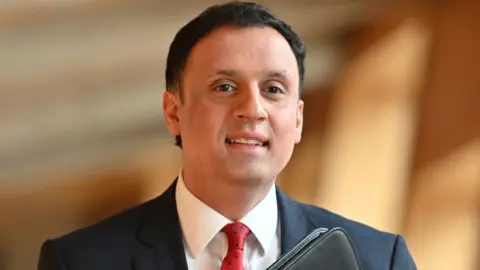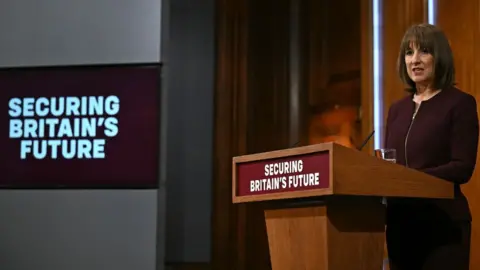Sarwar defends UK government welfare cuts
 Getty Images
Getty ImagesScottish Labour leader Anas Sarwar has defended the UK government's controversial welfare reforms.
Chancellor Rachel Reeves confirmed £5bn of cuts in the Spring Statement in a bid to meet self-imposed debt rules.
The cuts have been condemned by charities, Holyrood ministers and some Scottish Labour politicians.
Sarwar insisted the "principle" of reform was right but that any measures had to be "fair".
According to the UK government's own impact assessment, the welfare changes will put an additional 250,000 people, including 50,000 children, in relative poverty by 2030.
The Scottish government has accused Labour ministers of balancing their budget "on the backs of the poorest in society" and said the announcement would leave them with a funding shortfall.
Sarwar said the impact assessment only considered the benefits changes, not a "package of measures" announced by the UK government which could help tackle poverty.
He cited support to get people back into work, skills initiatives, improved workers' rights and a minimum wage increase.
Sarwar told BBC Scotland News: "You have to look at these measures in the round. But does every government have to do more to challenge poverty? Of course it does."
Funding fears
Scottish Finance Secretary Shona Robison said the Scottish government was facing a major funding shortfall as a result of the chancellor's announcement.
With Scottish spending on welfare already forecast to exceed Treasury funding for benefits by £1.3bn in 2025-26, Robison warned it would be tough to maintain current levels of spending.
The comments came shortly as it was revealed that the SNP administration had missed its legal targets for reducing child poverty.
Sarwar said there would be no "detrimental impact" on the Scottish government's budget in the next three years.
He added: "Of course there are decisions for the Scottish government to make about how it approaches welfare."
 PA Media
PA MediaThe Fraser of Allander Institute said the Scottish government would receive an extra £28m in 2025-26 as a result of the chancellor's spending plans.
The think tank reported the welfare reforms would lead to a £200m cut in Treasury funding for Scotland in 2028-29, and a £425m cut in 2029-30.
It said, overall, the Scottish government budget would be about £900m worse off by 2030 than was previously projected.
Robison told BBC Radio's Good Morning Scotland that ministers would look at "every lever we can" to avoid cutting benefits.
"We're in the business of keeping people out of poverty, not pushing children particularly into poverty," she said.
The Scottish government would have to "do things differently", the finance secretary said, adding: "We will do everything we can to enable us and the government in the future to have choices, because we don't want to make the choices the chancellor made yesterday.
"She had other choices she could have made yet she has decided to make these choices on the back of the most vulnerable."
Labour backlash
In her announcement, Reeves said health-related universal credit for new claimants, which was already due to be halved from April 2026, is to be be frozen in cash terms until 2030.
The chancellor also confirmed there will be a stricter eligibility test for personal independence payments (Pips) from November 2026.
The welfare cuts provoked criticism from Scottish Labour MP Brain Leishman, who has been a vocal critic of the UK government.
He said he was "very disappointed" with the chancellor's statement and would not vote in favour of the proposals.
He told BBC Scotland News: "Inequality and austerity, they are choices, they are political choices, we need to change the script."
News of the cuts prompted former Labour MSP Neil Findlay to quit the party.
It also sparked criticism from Scottish Labour frontbencher Carol Mochan and MSP Monica Lennon.
